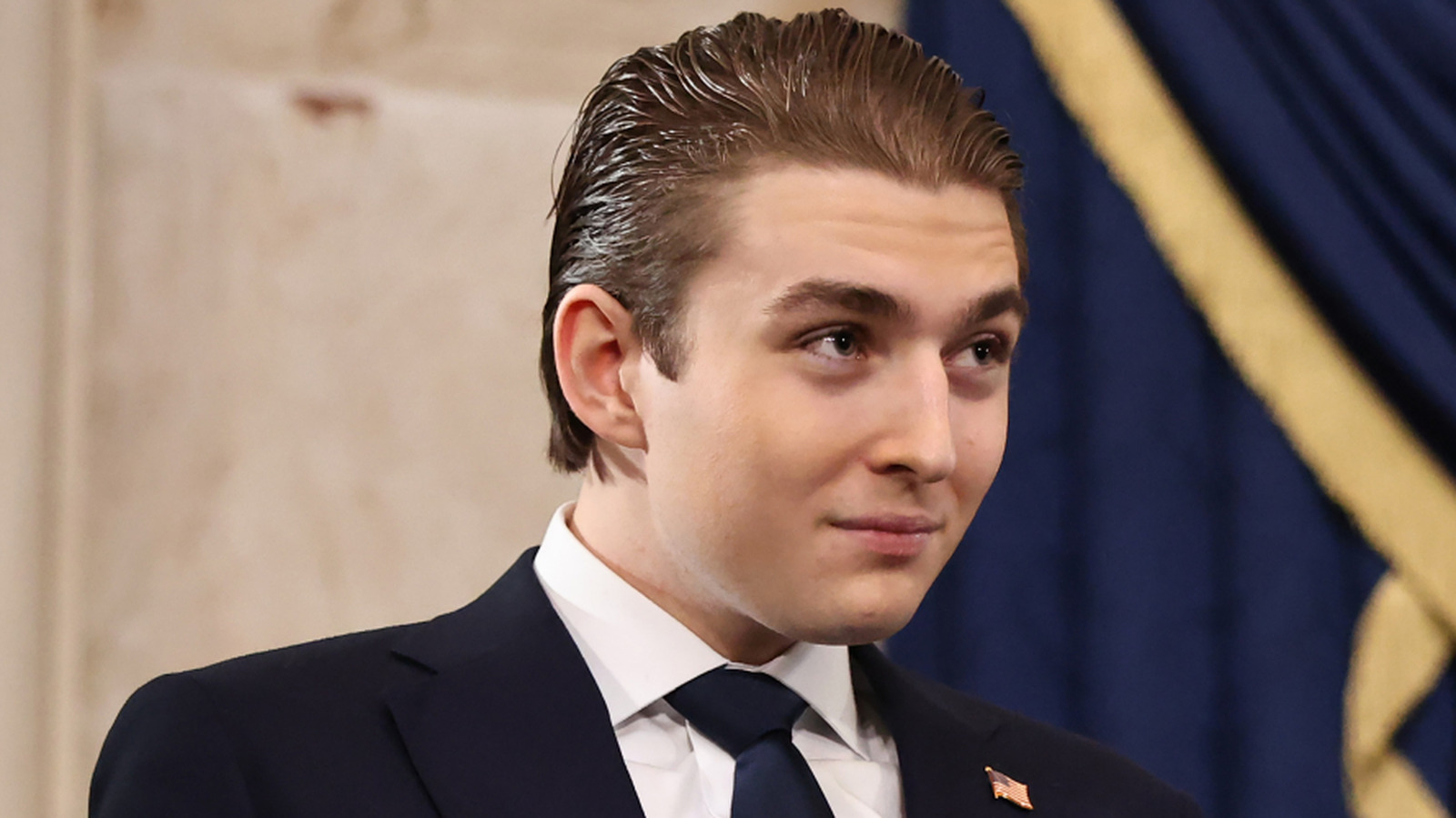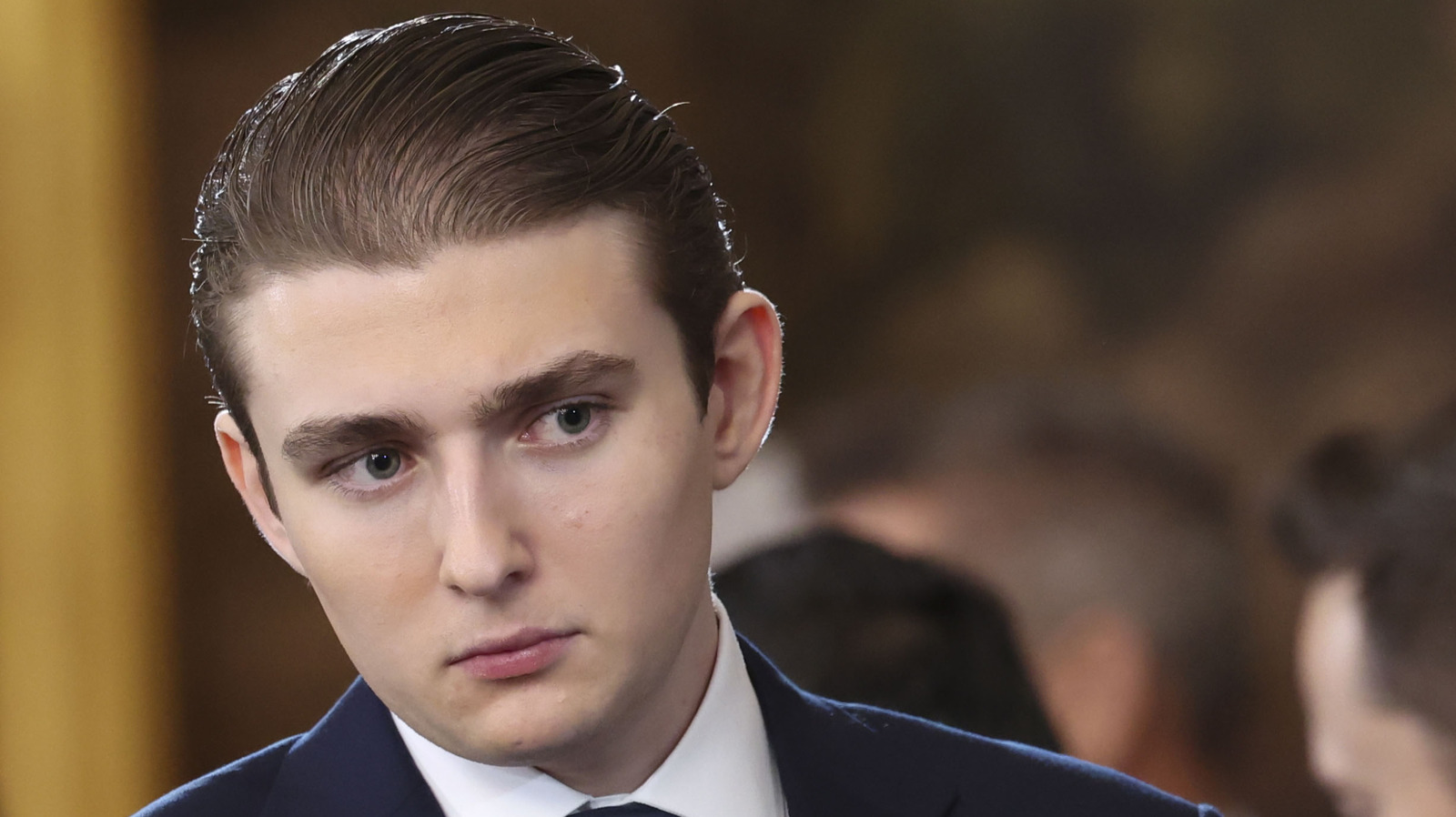Could Barron Trump, the famously private son of former President Donald Trump, be the next singing sensation? Recent online buzz suggests a surprising emergence onto the stage of "America's Got Talent," but the truth behind these viral claims is far more complex than meets the eye.
The internet has been set ablaze with videos purportedly showing Barron Trump delivering a heartfelt and captivating performance on the popular NBC reality show. These clips, circulating across various social media platforms, depict him with a "deep, warm voice" and a confident presence, seemingly stunning the audience with his talent. However, before fans start envisioning a new career path for the young Trump, a dose of reality is crucial. The claim that Barron Trump actually appeared on "America's Got Talent" is, in fact, a hoax.
| Category | Information |
|---|---|
| Full Name | Barron William Trump |
| Date of Birth | March 20, 2006 |
| Place of Birth | New York City, New York, USA |
| Parents | Donald Trump (father), Melania Trump (mother) |
| Siblings | Donald Trump Jr., Ivanka Trump, Eric Trump, Tiffany Trump (half-siblings) |
| Education | St. Andrew's Episcopal School, Oxbridge Academy |
| Known For | Being the youngest son of Donald Trump |
| Public Image | Famously private; rarely makes public statements |
| Controversies/Hoaxes | Subject of AI-generated videos and false claims, including the "America's Got Talent" hoax |
| Website | DonaldJTrump.com (Official website of his father, Donald Trump) |
The source of this misinformation stems from the proliferation of AI-generated videos. In early 2025, a series of these videos began to surface, falsely depicting Barron Trump performing on "America's Got Talent." These videos, often accompanied by sensational headlines and misleading descriptions, quickly gained traction, fooling many into believing the claims. The ease with which these AI-generated videos can be created and disseminated has made it increasingly difficult to distinguish fact from fiction, highlighting the growing challenges of navigating the digital age.
- Mike Myers Biography Movies More Discover His Career
- Bollywoodhollywood Movies Find Your Download Tips Help
The specific video that sparked much of the frenzy showed Barron Trump supposedly singing, leading to a surge in online searches for the query, "Did Barron Trump sing on TV?" Google searches for this term reportedly increased by a staggering 1,200 percent, demonstrating the widespread curiosity and initial believability of the hoax. Adding fuel to the fire, another video surfaced, this one titled "How Great Thou Art (Barron Trump Singing Imagined)," featuring a digitally created image of Barron Trump singing with an acoustic guitar. This particular video, posted by an account associated with the "MAGA" movement, further amplified the speculation and fueled the belief among some that the performance was genuine.
The incident underscores a broader trend of misinformation and the weaponization of AI in creating deceptive content. The ability to convincingly mimic voices and appearances has reached a point where even discerning viewers can be misled. This has significant implications for public discourse, as fabricated narratives can quickly spread and influence public opinion, particularly in the realm of politics and celebrity culture.
It is important to note that Barron Trump is known for being fiercely protected from the public eye. He has largely remained out of the spotlight, with his parents carefully guarding his privacy. This makes the idea of him suddenly appearing on a reality television show, known for its dramatic reveals and emotional storytelling, seem highly improbable to those familiar with the Trump family's approach to media exposure.
The "America's Got Talent" hoax is not an isolated incident. It follows a pattern of online misinformation campaigns that target public figures, using AI and social media to create and spread false narratives. These campaigns are often designed to exploit existing political or cultural divisions, further polarizing public opinion and eroding trust in institutions and media outlets.
The fact that this hoax gained so much traction speaks to the power of suggestion and the willingness of some to believe sensational claims, especially when they align with pre-existing biases or beliefs. The "Barron Trump's AGT performance" storyline likely appealed to those who either admire the Trump family and would be delighted to see Barron showcase his talents, or to those who are critical of the family and might be inclined to believe unflattering narratives about them.
The incident also serves as a cautionary tale about the importance of critical thinking and media literacy in the digital age. In a world saturated with information, it is crucial to question the sources of news and information, to verify claims before sharing them, and to be aware of the potential for manipulation and deception. Relying solely on social media for news and information can be particularly risky, as these platforms are often rife with unverified content and propaganda.
In the aftermath of the hoax, several fact-checking organizations and news outlets debunked the claims, providing evidence that the videos were indeed AI-generated. However, even after the truth was revealed, some continued to believe the false narrative, highlighting the challenge of correcting misinformation once it has taken root in the public consciousness.
The "Barron Trump's AGT performance" hoax highlights the need for increased vigilance and awareness regarding AI-generated content. As technology continues to advance, it is becoming increasingly difficult to distinguish between what is real and what is not. This poses a significant challenge to individuals, institutions, and society as a whole, requiring a concerted effort to promote media literacy and critical thinking skills.
Furthermore, the incident raises ethical questions about the use of AI to create and disseminate deceptive content. While AI has many positive applications, its potential for misuse is undeniable. It is crucial to develop ethical guidelines and regulations to govern the development and deployment of AI technologies, ensuring that they are used responsibly and do not contribute to the spread of misinformation or the erosion of trust.
The case of Barron Trump and the "America's Got Talent" hoax serves as a stark reminder of the challenges and dangers of the digital age. As AI technology continues to evolve and social media platforms remain susceptible to manipulation, it is more important than ever to cultivate critical thinking skills, promote media literacy, and demand accountability from those who create and disseminate information. The future of truth and trust may depend on it.
Ultimately, the "Barron Trump's AGT performance" saga is a testament to the power of the internet to both connect and deceive. It serves as a valuable lesson in the importance of verifying information, questioning assumptions, and remaining skeptical of claims that seem too good, or too bad, to be true. In the age of AI and social media, critical thinking is not just a skill; it is a necessity.
The rapid spread of the AI-generated videos also highlights the challenges faced by public figures, particularly those who are already subject to intense media scrutiny. The ability to fabricate convincing videos and narratives can easily damage reputations and create lasting negative impressions, even after the truth is revealed. This underscores the need for robust legal and ethical frameworks to protect individuals from the harmful effects of online misinformation and defamation.
Moreover, the incident raises questions about the role of social media platforms in combating the spread of false information. While many platforms have implemented policies to address misinformation, these efforts are often insufficient to prevent the rapid dissemination of deceptive content. Platforms need to invest in more effective tools and strategies to identify and remove AI-generated videos and other forms of misinformation, while also promoting media literacy and critical thinking among their users.
The "Barron Trump's AGT performance" hoax also has implications for the entertainment industry, which is increasingly reliant on AI technology for content creation and distribution. While AI can be a valuable tool for enhancing creativity and efficiency, it also poses risks to artists and performers. The ability to replicate voices and appearances can potentially undermine the value of original talent and create opportunities for fraud and exploitation.
In the future, it is likely that AI-generated videos will become even more sophisticated and difficult to detect. This will require a multi-faceted approach to combat misinformation, including technological solutions, media literacy initiatives, and legal and ethical frameworks. It is crucial to foster a culture of critical thinking and skepticism, where individuals are empowered to question the information they encounter online and to demand accountability from those who create and disseminate content.
The "Barron Trump's AGT performance" incident is a microcosm of the larger challenges facing society in the digital age. As technology continues to advance and the flow of information becomes increasingly complex, it is essential to adapt and evolve our strategies for navigating the digital landscape. This requires a commitment to education, innovation, and ethical principles, ensuring that technology serves humanity rather than the other way around.
The incident also brings into focus the pressures faced by children of prominent figures. Barron Trump, in particular, has been the subject of intense public interest since his father's foray into politics. While his parents have strived to shield him from the public eye, he remains a target for media speculation and online misinformation. This underscores the importance of protecting the privacy and well-being of children, especially those who are vulnerable due to their family's public profile.
The implications of the "Barron Trump's AGT performance" hoax extend beyond the realm of entertainment and politics. It also has relevance to education, as it highlights the need for schools to incorporate media literacy and critical thinking skills into their curriculum. Students need to be taught how to evaluate sources of information, identify bias, and distinguish between fact and fiction. This will equip them with the tools they need to navigate the digital world responsibly and effectively.
Moreover, the incident underscores the importance of fostering a culture of empathy and understanding online. The spread of misinformation is often fueled by prejudice and intolerance, as people are more likely to believe negative narratives about groups or individuals they dislike. By promoting respectful dialogue and challenging harmful stereotypes, we can create a more inclusive and informed online environment.
The "Barron Trump's AGT performance" incident also has implications for the legal system. As AI-generated videos become more sophisticated, it may become necessary to develop new laws and regulations to address the creation and dissemination of deceptive content. This could include measures to protect individuals from defamation, copyright infringement, and other forms of online harm.
In the long term, it is essential to foster a sense of digital citizenship, where individuals take responsibility for the information they share online and actively contribute to a more accurate and trustworthy online environment. This requires a collective effort from individuals, institutions, and governments, working together to promote media literacy, critical thinking, and ethical behavior in the digital age.
The story of Barron Trump and the fabricated "America's Got Talent" appearance serves as a stark warning about the perils of unchecked technological advancement and the ease with which falsehoods can proliferate in the digital age. It underscores the imperative for constant vigilance, critical evaluation, and a renewed commitment to truth and accuracy in the information we consume and share.
Beyond the immediate incident, the episode throws into sharp relief the broader societal challenge of maintaining trust and credibility in an era of unprecedented information flow. As AI becomes increasingly sophisticated and capable of creating ever more realistic simulations, the lines between reality and fabrication become increasingly blurred. This poses a significant threat to democratic institutions, social cohesion, and individual well-being.
The incident also calls for a reassessment of the role of algorithms and artificial intelligence in shaping our perceptions of reality. Social media platforms and search engines rely on algorithms to filter and prioritize information, often based on user preferences and engagement metrics. This can create echo chambers and filter bubbles, where individuals are only exposed to information that confirms their existing beliefs, making them more susceptible to misinformation and propaganda.
To combat these challenges, it is crucial to promote algorithmic transparency and accountability. Social media platforms and search engines should be transparent about how their algorithms work and how they impact the information users see. They should also be held accountable for the spread of misinformation on their platforms and should take steps to mitigate the harmful effects of algorithmic bias.
The "Barron Trump's AGT performance" hoax serves as a potent reminder of the need for ongoing education and awareness about the risks of online misinformation. Schools, libraries, and community organizations should offer workshops and programs to teach individuals how to evaluate sources of information, identify bias, and detect fake news. These initiatives should be tailored to different age groups and levels of digital literacy.
In addition to education and awareness, it is also essential to invest in technological solutions to combat misinformation. This could include developing AI-powered tools that can automatically detect and flag fake videos and other forms of deceptive content. These tools should be used in conjunction with human oversight to ensure accuracy and fairness.
The incident also highlights the importance of fostering a culture of skepticism and critical thinking. Individuals should be encouraged to question the information they encounter online and to seek out diverse perspectives. They should also be wary of claims that seem too good to be true or that evoke strong emotional reactions.
Ultimately, the fight against misinformation requires a collective effort from individuals, institutions, and governments. We must all work together to promote truth, accuracy, and responsible online behavior. The future of democracy and social cohesion depends on it.
As we move forward, it is imperative that we learn from the "Barron Trump's AGT performance" hoax and take proactive steps to protect ourselves and our communities from the harmful effects of online misinformation. By fostering media literacy, promoting critical thinking, and demanding accountability from those who create and disseminate information, we can create a more informed and trustworthy digital world.



Detail Author:
- Name : Keith Rodriguez
- Username : schmidt.lorine
- Email : brant21@adams.com
- Birthdate : 1992-06-28
- Address : 799 Tracy Forks Weissnatmouth, NJ 88954-9895
- Phone : 1-515-970-2978
- Company : Funk, O'Kon and Lakin
- Job : Military Officer
- Bio : Voluptatem ab et fuga. Quam minima nulla est perspiciatis sit sapiente voluptatem. Rem voluptatum vitae quis rerum accusantium accusantium quis.
Socials
linkedin:
- url : https://linkedin.com/in/abnerfadel
- username : abnerfadel
- bio : Doloremque officia est nemo maiores ea eum.
- followers : 2941
- following : 1661
twitter:
- url : https://twitter.com/abner_xx
- username : abner_xx
- bio : Autem voluptas dolorem tenetur omnis omnis porro. Qui dolorum voluptatem quas iure consequatur neque vero. Aut totam et tenetur.
- followers : 6710
- following : 323